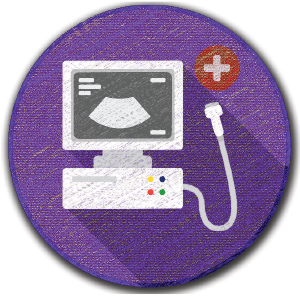
Explore This Issue
ACEP Now: Vol 36 – No 07 – July 2017ILLUSTRATION: Chris Whissen & Shutterstock.com
For those of you who haven’t been recently barraged by advertisements, a new organization called the Alliance for Physician Certification & Advancement (APCA) is offering a “special opportunity” to be certified in emergency ultrasound. It sounds awesome, except for a couple things: 1) It costs money, and 2) It’s completely unnecessary. The ACEP Emergency Ultrasound Guidelines already outline the pathways for emergency ultrasound training, which are either residency- or practice-based.
So why would a new organization suddenly offer a certificate for emergency ultrasound to emergency physicians? I have two thoughts: money and power. APCA’s POCUS Academy is an online program that costs hundreds of dollars to take and must be maintained annually. Since it is virtual, it can be replicated at little cost to APCA.
Who is APCA? APCA is under the umbrella of a larger organization called Inteleos. Inteleos also houses the American Registry for Diagnostic Medical Sonography (ARDMS). If ARDMS sounds familiar to you, it is because many emergency physicians have obtained Registered Diagnostic Medical Sonographer (RDMS) credentials. This past year, Inteleos restructured so that physician certification is done through APCA and technician certification is done through ARDMS. In the past, RDMS wasn’t so much a threat as an option for those of us who had done more scans and training. RDMS credentials may have helped many emergency ultrasound directors achieve recognition of ultrasound expertise when emergency ultrasound was in its infancy.
Clinical ultrasound is now a Residency Review Committee requirement and an emergency medicine milestone, so there is no need for any emergency physician to have RDMS credentials. Now that ARDMS has changed its robes to APCA and is attempting to profit from and exert control in our specialty, I feel it is time for emergency medicine and ARDMS to part ways.
External certification, in general, is bad for our specialty. In 1998, the American Medical Association created Resolution 802, which states that ultrasound is in the scope of practice of appropriately trained physicians and that training and education standards should be developed by each physician’s respective specialty. Since 2001, the emergency ultrasound guidelines have become one of the most utilized documents for clinical (point-of-care) ultrasound in the world. By leading the way in emergency ultrasound, we have not only saved lives but also discovered uses for ultrasound that would otherwise never have been realized (eg, extended focused assessment with sonography for trauma [FAST], critical care resuscitation, and procedural guidance). By never allowing external control, emergency medicine has been able to push the frontier of emergency ultrasound in modern medicine. It is incumbent on our specialty that we keep these tools under our supervision and never abdicate this responsibility to external entities.
Pages: 1 2 | Single Page





No Responses to “Opinion: Emergency Physicians Don’t Need Ultrasound Certification from External Agencies”